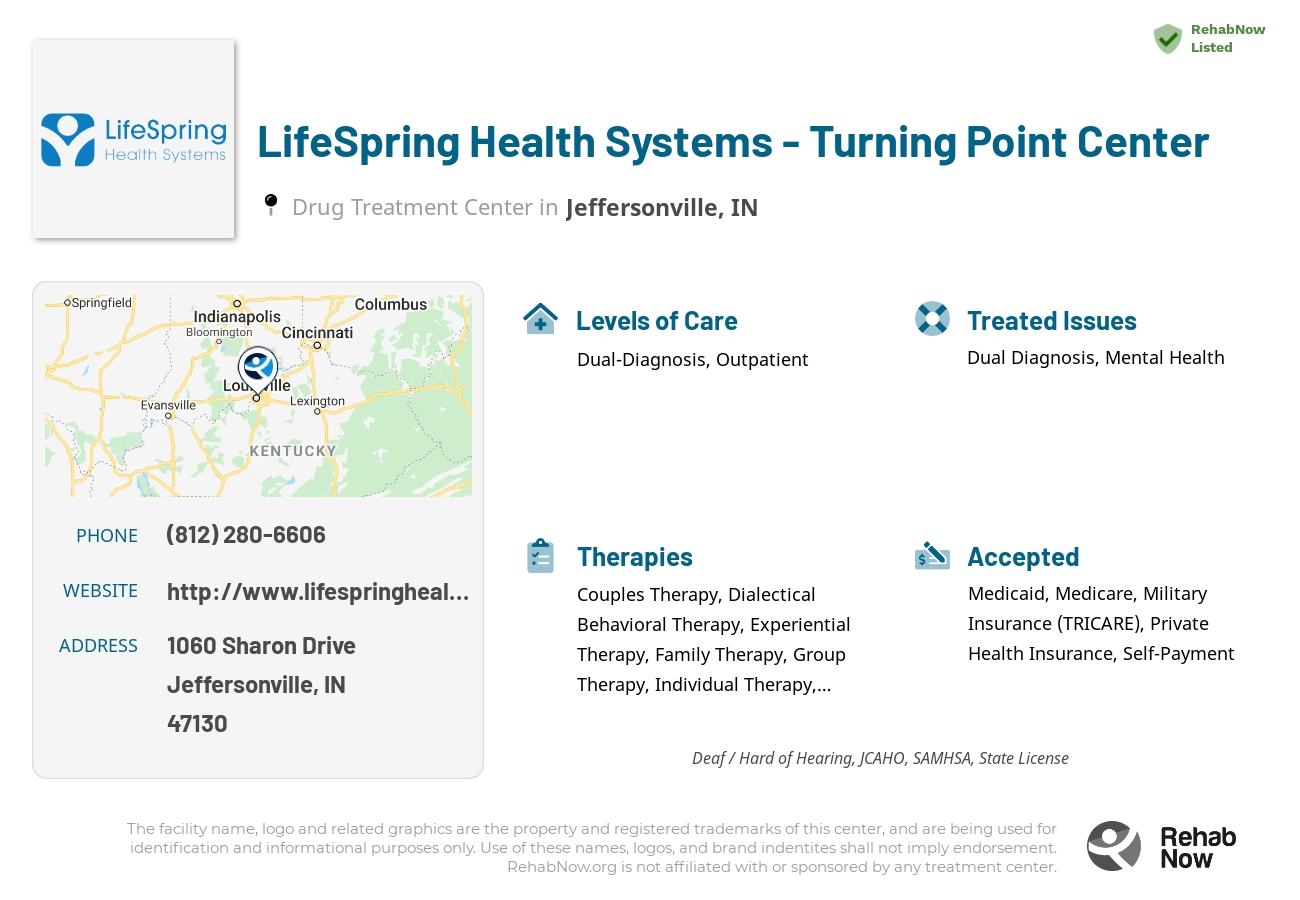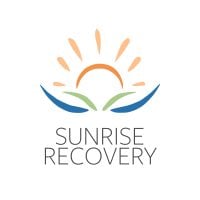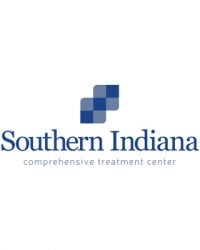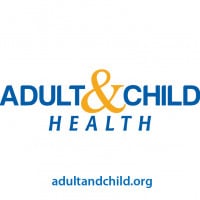LifeSpring Health Systems - Turning Point Center
Drug Rehab Center in Jeffersonville, Indiana
LifeSpring Health Systems - Turning Point Center is a JCAHO, SAMHSA, and state-licensed premier drug rehab facility in Jeffersonville, Indiana that specializes in evidence-based therapies to treat substance abuse, drug addiction, addiction to alcohol and eating disorders as well as dual diagnosis mental health issues for both outpatient and residential patients.
About This Indiana Facility
LifeSpring Health Systems - Turning Point Center is a comprehensive addiction treatment facility located in Jeffersonville, IN. Their primary focus is providing high-quality care for individuals struggling with substance abuse and co-occurring mental health disorders. With a commitment to improving the quality of life in their community, they offer a continuum of care tailored to each client's unique needs.
- Medically supervised detoxification to ensure safe and comfortable withdrawal management
- Residential drug rehab programs with personalized treatment plans and a supportive environment
- Intensive outpatient program (IOP) for those balancing treatment with daily responsibilities
The Turning Point Center is accredited by JCAHO, SAMHSA, and holds a valid state license. Their experienced staff provides evidence-based therapies, including cognitive-behavioral therapy, family counseling, and medication-assisted treatment (MAT) for substance use disorders.
The facility treats a wide range of addictions, including alcoholism, substance abuse, and eating disorders. Their comprehensive approach combines various treatment modalities, such as individual and group therapy, to address both addiction and co-occurring mental health conditions like depression, anxiety, and PTSD. With a focus on long-lasting recovery, the Turning Point Center offers resources and support to help individuals and families create an individualized plan for sustained sobriety.
Genders
Ages
Modality
Additional
Accreditations
State License
SAMHSA

JCAHO
Conditions and Issues Treated
People who abuse drugs are likely to suffer from an addiction, which can cause serious health problems. When it comes to helping drug abusers get sober, there are many options to choose from. It is essential to state that there is no “”correct”” way of doing things. People are different, and they need different types of help to get over their addiction.
Dual Diagnosis refers to someone who is both dealing with addiction and another mental health issue.
There are different kinds of Dual Diagnosis: A person who simultaneously experiences both a mental illness and an addiction disorder. Or, a person who experiences one or more coexisting (simultaneous) mental health conditions in addition to a primary substance use disorder.
Some conditions that commonly co-occur with addiction include:
- Personality Disorders (Borderline, Narcissistic)
- Mood Disorders (Bipolar Disorder, Depression, Anxiety Disorder)
- PTSD (Post Traumatic Stress Disorder), OCD (Obsessive Compulsive Disorder), ADHD (Attention Deficit Hyperactivity Disorder)
- Schizophrenia, Psychosis, Hallucinations, Delusions
Levels of Care Offered at LifeSpring Health Systems - Turning Point Center
This center offers a variety of custom treatment tailored to individual recovery. Currently available are Dual-Diagnosis, Outpatient, Residential, with additional therapies available as listed below.
Outpatient treatment programs provide drug and alcohol addiction treatment through individual sessions with a counselor, group therapy, 12-step meetings, and other activities to help individuals gain sober living skills. Most programs are designed for those individuals who have completed a medically supervised detoxification program and provide opportunities for clients to begin the process of early recovery.
Outpatient programs also offer a level of medical support as needed and psychological backing through therapy. Clients are encouraged to live at home, though there may be some flexibility regarding this requirement based on the circumstances and needs of each patient.
Outpatient treatment is perhaps the most common type of dual diagnosis program available. It does not pose a significant financial burden on patients. However, it is essential to note that outpatient treatment does not provide the support and supervision given in residential programs. Some addicts may need this level of support to maintain their sobriety.
Residential treatment programs are those that offer housing and meals in addition to substance abuse treatment. Rehab facilities that offer residential treatment allow patients to focus solely on recovery, in an environment totally separate from their lives. Some rehab centers specialize in short-term residential treatment (a few days to a week or two), while others solely provide treatment on a long-term basis (several weeks to months). Some offer both, and tailor treatment to the patient’s individual requirements.
Therapies & Programs
Therapy sessions focused on the individual addict can provide much-needed guidance as they work toward overcoming their addiction. These types of sessions typically involve guidance from a therapist, who will help addicts identify and process their feelings and cravings.
During these sessions, addicts may develop plans for coping with the triggers that typically lead to relapse and learn how to avoid those triggers during their recovery process.
If you are looking for drug recovery, couples therapy can be a great option. This type of therapy can help rebuild trust and joy in relationships that may have been damaged by addiction. It can also help reduce the dysfunctional behavior in a relationship that may trigger addiction. A patient’s partner will be involved in the process. They can also benefit from therapy, especially if they are trying to live with an addict.
The main goal of family therapy for drug addiction is to create an environment where communication can occur without judgment, hostility, or blame that often occurs within a family.
Family therapy is a type of group problem-solving that aims to improve communication and relationships between the patient, their family, and sometimes friends. The therapist is with the family as they learn to communicate with each other differently, especially with the addict when s/he is using.
The family can learn to reduce their enabling behavior or rally together and support each other during tough times. The patient also learns how to deal with their addiction and maintain sobriety while interacting with the family.
Different types of addiction treatment services are available. Within this article, group therapy is of interest due to its high success rate compared to individual therapy. Group therapy settings are beneficial because they allow recovering addicts to build a strong support network.
Benefits of group therapy are:
- Reduces feelings of isolation
- Immediate access to social support in the form of fellow addicts in recovery
- Lowers risk of relapse
- Increases rate of sobriety
- Builds coping skills that can be applied to everyday life
Trauma Therapy is a form of therapy that involves working with a patient to help them process and understand the past trauma(s) in their life. The idea behind it is that while some people can experience traumatic events and not have lasting psychiatric symptoms, many others will. In these cases, memories of the event get hidden from consciousness but continue to influence how the person processes and copes with things in their life. They may avoid situations that resemble what happened or become suddenly angry or irritated to a situation that reminds them of a past event.
With the help of a therapist, people can go back over memories and experiences. This helps them understand why they are having problems coping with certain situations and how they can change how they think and react to things. This therapy is typically done using techniques such as visualization, discussion, and writing down thoughts and feelings.
Trauma therapists will work with clients to help them understand their past and present relationships. Many times, patients may believe that something is inherently wrong with them or that they are unworthy of love. A therapist aims to correct these negative feelings and behaviors by helping the person realize that their actions do not reflect who they truly are.
One of the main goals of trauma therapy is to help clients express their emotions and talk about what they are feeling. This benefits both to increase awareness of how certain events have impacted them in the past and enables patients to realize that they can make changes in their lives.
Dialectical Behavior Therapy is a cognitive-behavioral therapy that helps addicts balance their thoughts and emotions to change their behavior. It was designed for those vulnerable to self-harm and suicidal thoughts and aims to help patients understand the connection between their feelings, emotions, and behaviors. It is effective for those whose addictions and behaviors stem from severe mental health issues.
Cognitive Behavioral Therapy (CBT) is used by drug treatment centers to help addicts comprehend the causes of their substance abuse and the consequences that follow. Through CBT, clients learn to recognize and avoid high-risk situations and cope with challenging situations when they arise.
CBT treatment often includes a combination of individual therapy, group therapy, lectures, and other activities. The treatment’s goal is to help addicts gain self-control and maintain abstinence from drugs and alcohol over the long term so that an addict can get sober and lead a more productive life.
CBT is particularly effective in helping people overcome their drug problems, especially people whose drug abuse is motivated by self-defeating beliefs and emotions.
Those struggling with addiction in Indiana can benefit from learning certain life skills. It is not as simple as quitting drinking or taking drugs and thinking that the hard part is over. Being sober means living a whole new way of life. Many recovering addicts have found that they need to develop talents like time management, organization, communication skills, socialization skills, and self-esteem to make their life in sobriety work.
Drug and alcohol addiction can lead to a breakdown in life skills. Learning certain life skills can help those who are struggling with addiction. Life skills training at LifeSpring Health Systems - Turning Point Center in Jeffersonville, IN teaches patients skills such as time management, budgeting, and social abilities to improve their quality of life and prevent relapse.
An addict’s life skills are maladaptive, meaning they are counterproductive. An addict may have learned poor time management skills growing up, have a hard time budgeting money, or be socially awkward. An addict’s poor life skills can lead to relapse and the inability to achieve long-term sobriety. Life skills training teaches patients effective coping mechanisms, which can help them live a clean and sober life.
Patient Experience
Experiential Therapy at LifeSpring Health Systems - Turning Point Center
Experiential therapy is a form of psychotherapy where patients are asked to engage in activities such as role-play, poetry writing, music composition, exercising, or journaling to help process intense feelings. The aim of the therapy is to help patients access deeper, often hidden emotions by helping them explore their own body and mind.
Payment Options Accepted
For specific insurance or payment methods please contact us.
Is your insurance accepted?
Ask an expert, call (888) 674-0062
Lifespring Health Systems Associated Centers
Discover treatment facilities under the same provider.
- LifeSpring Health Systems - Floyd County Office in New Albany, IN
- LifeSpring Health Systems - Scott County Office in Scottsburg, IN
- LifeSpring Health Systems - Washington County Office in Salem, IN
- LifeSpring Health Systems - O'Bannon Center in Corydon, IN
- LifeSpring Health Systems - Jeffersonville in Jeffersonville, IN
Learn More About Lifespring Health Systems Centers
Additional Details
Specifics, location, and helpful extra information.
Jeffersonville, Indiana 47130 Phone Number(812) 280-6606 Meta DetailsUpdated April 15, 2024
Staff Verified
Patient Reviews
There are no reviews yet. Be the first one to write one.
Jeffersonville, Indiana Addiction Information
The state of Indiana ranks 14th in the nation for drug abuse, but 17th for drug overdoses. The state has many high-quality rehabilitation centers, but reports show that there are about 20 deaths per 100,000 people. This is due to its location making it a drug trafficking haven, where many drugs are further distributed into the country.
Alcohol and opioid addiction are major concerns in Jeffersonville, IN. Drug overdose deaths increased by 646% between 1999 and 2016. There were over 1,000 admissions to treatment centers for drug abuse in Jeffersonville in 2016. Drug treatment in Jeffersonville, Indiana, can vary depending on the facility. However, most drug treatment programs will offer some form of detoxification, individual and group therapy, and aftercare services.
Treatment in Nearby Cities
- Brookville, IN (86.9 mi.)
- Boonville, IN (85.9 mi.)
- Coal City, IN (96.2 mi.)
- Indianapolis, IN (104.5 mi.)
- New Albany, IN (5.4 mi.)
Centers near LifeSpring Health Systems - Turning Point Center
The facility name, logo and brand are the property and registered trademarks of LifeSpring Health Systems - Turning Point Center, and are being used for identification and informational purposes only. Use of these names, logos and brands shall not imply endorsement. RehabNow.org is not affiliated with or sponsored by LifeSpring Health Systems - Turning Point Center.








